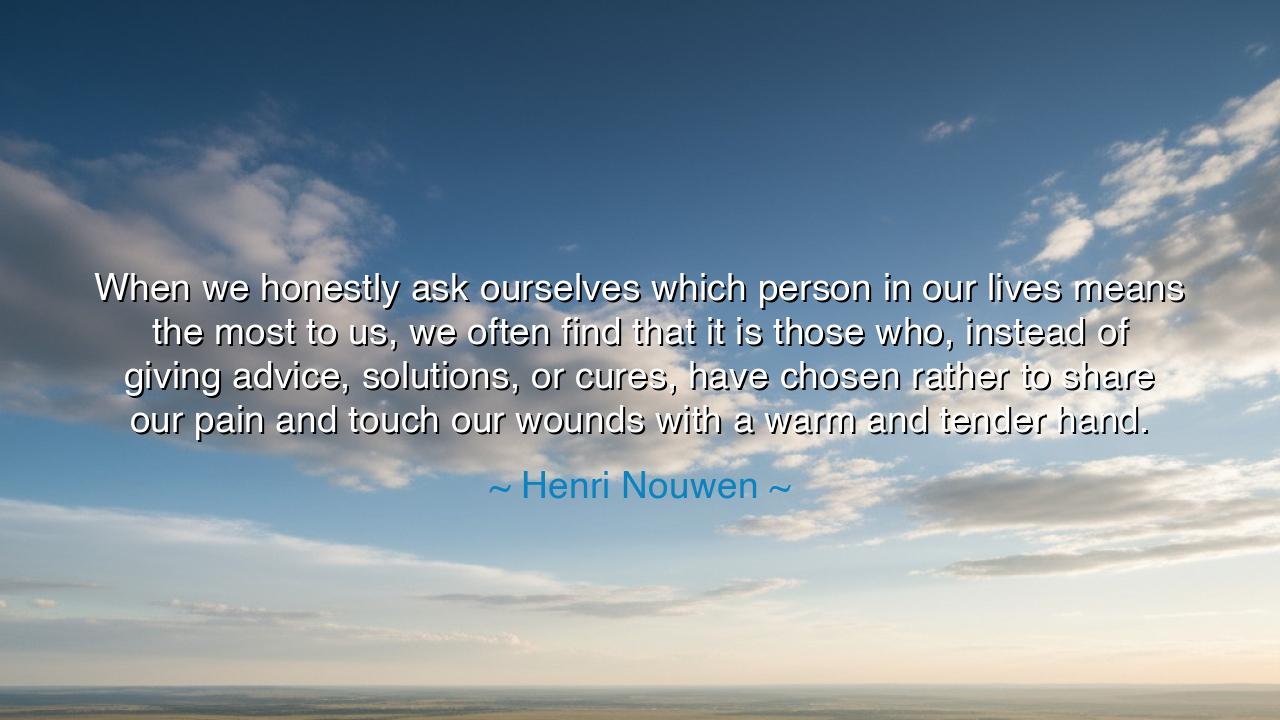
When we honestly ask ourselves which person in our lives means
When we honestly ask ourselves which person in our lives means the most to us, we often find that it is those who, instead of giving advice, solutions, or cures, have chosen rather to share our pain and touch our wounds with a warm and tender hand.






“When we honestly ask ourselves which person in our lives means the most to us, we often find that it is those who, instead of giving advice, solutions, or cures, have chosen rather to share our pain and touch our wounds with a warm and tender hand.”
Thus wrote Henri Nouwen, the mystic of compassion, the priest who understood the trembling depth of the human heart. In this profound meditation, Nouwen reveals a truth that echoes across the ages—that the greatest act of love is not to fix another’s suffering, but to share it. He teaches that the soul does not hunger for instruction or remedy as much as it longs for presence, for the quiet companionship of one who dares to stand within our sorrow without fear. For when pain comes, wisdom may soothe the mind, but empathy heals the heart.
The origin of this quote flows from Nouwen’s own life of struggle and devotion. A theologian, psychologist, and spiritual guide, he spent years among the wounded—students wrestling with faith, the poor and forgotten, and the mentally disabled at L’Arche, a community of tenderness and trust. There he discovered what many philosophers and preachers had missed: that true healing does not arise from power, knowledge, or even prayer alone, but from the humble act of being with. It was this realization that moved him to write these words—an offering born of a life spent walking alongside the broken rather than standing above them.
The meaning of Nouwen’s words is gentle yet revolutionary. When we look into the mirror of memory and ask who has touched us most deeply, it is rarely the one who gave the perfect advice, but the one who sat beside us in silence, who reached out with a trembling hand when we were too weak to speak. Such a person becomes, in that moment, a living embodiment of mercy. Their tenderness says what words cannot: “You are not alone.” In their company, the soul feels safe to weep, to breathe, to heal. This is the sacred art of compassion, which sees another’s suffering not as a problem to be solved, but as a mystery to be shared.
Consider the story of Mother Teresa, who spent her life among the poorest of the poor in Calcutta. She did not claim to cure disease or abolish poverty; she simply tended to each person with the warm and tender hand Nouwen describes. She sat with the dying, washed their wounds, and whispered words of love into ears that had long stopped hearing kindness. Her gift was not in curing bodies, but in healing spirits—reminding each soul of its dignity, its belovedness. When she said, “We cannot do great things, only small things with great love,” she lived the truth that Nouwen later wrote: the deepest comfort comes not from the solution, but from the presence that honors another’s pain.
Nouwen’s wisdom challenges the modern heart, which so often rushes to fix rather than to feel. We are quick to give answers, to offer plans, to patch the wound with words. But pain, like a storm, must sometimes be endured, not escaped. When we meet someone in suffering, our task is not to banish their pain, but to make it bearable by standing with them in the midst of it. In doing so, we honor their humanity. For true friendship, as Nouwen reminds us, does not hide from the darkness—it enters it, holding a lantern of love.
His words also remind us that vulnerability is the pathway to connection. The one who touches our wounds must not be afraid of their own. It is through our shared fragility that we recognize one another. As Nouwen wrote elsewhere, “The friend who can be silent with us in a moment of despair, who can stay with us in an hour of grief, who can tolerate not knowing… that is a friend who cares.” To offer such love is to stand, as it were, at the threshold of the sacred—to be a healer of souls not by wisdom, but by presence.
Let this, then, be the lesson for all who would love deeply and live wisely: Do not rush to mend what you do not yet understand. When a friend suffers, do not speak first—listen. When they weep, do not explain—embrace. Offer not the sharpness of intellect, but the gentleness of heart. For there are pains that cannot be solved, only shared; wounds that cannot be cured, only touched. Be the one who stays when others flee, who brings warmth when the world grows cold, who gives not solutions but solidarity.
Thus, the timeless wisdom of Henri Nouwen endures like a candle glowing in the dark: “Those who share our pain and touch our wounds with a warm and tender hand are the ones who mean the most.” To live by these words is to become a servant of compassion, a bearer of divine love. And when we touch another’s wound with kindness, we discover that in healing them, we too are healed—for love, once given, circles back like light reflected from the face of God.






AAdministratorAdministrator
Welcome, honored guests. Please leave a comment, we will respond soon